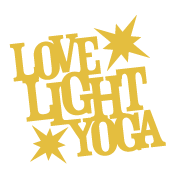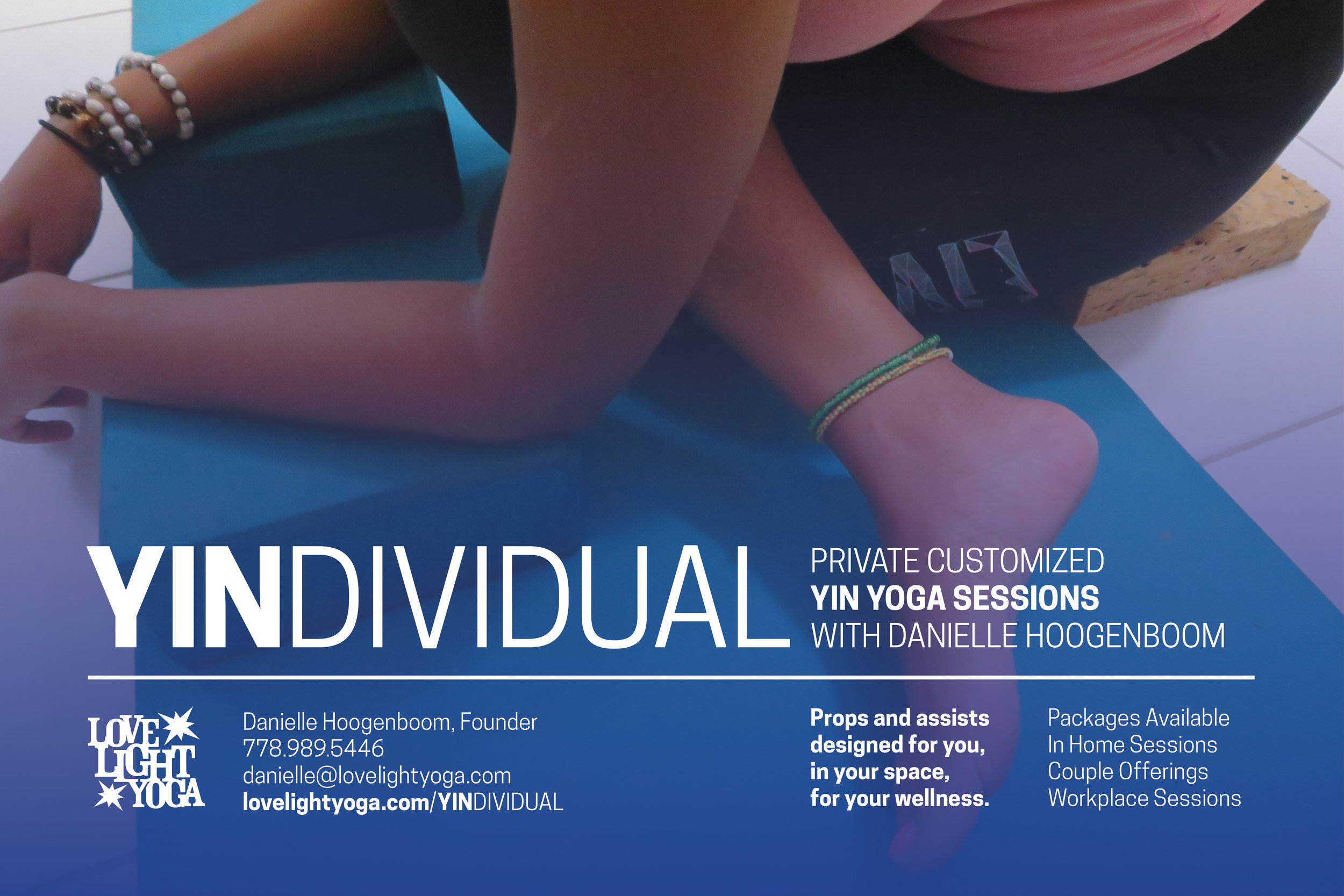What is Yin to Me?
/Guest Blogger: Mary
Yin, to me, is similar to the psychological concept of rapprochement. It’s learning that you can always come home to grounded security, peace, and compassion. Far too often in this world, we stray from “home” (i.e., our true selves), much like an infant exploring his or her surroundings. This infant returns to the mother, and with each return, the infant’s belief in security and love is reinforced. Having this firm base allows for more confidence to leave and explore, knowing he or she can always return. However, there are so many distractors in our world, we tend to get lost and preoccupied, to the point where we forget that we were only straying for a moment, with the intention of coming home, coming back to what matters. Almost as if in a trance, we continue to stray and forget our purpose.
Yoga is the reminder to come home, or reconnect with our truest form of our self. Yin, for me, is being still in what exists in that place. Is it a place of calm, turmoil, despair, exhaustion, peace, love? What happened to our home while we were away, distracted by all the glitter around us? For me, it is an ebb of every emotion. There are no thoughts or words. It is the accumulation of all of my life experiences I have had out in the world, a consequence of all actions, thoughts, and experiences. The residual emotions from my life have been simmering, waiting for me to come home and experience them. Yin provides a path to access this, a guiding light leading home, to that which resides within each of us. Yin allows us to experience the product of our life. There is a lot of pain and triumphs. There is a lot of everything. If I look for any one feeling, I can find it, for it is all there. It’s as if this space has been keeping track of everything – observing, feeling, and remembering all.
Yin, as a practice, is a time to revisit and rebuild our home. It is a time to sit in the middle of it, and observe, take inventory. It’s not a question of why do I have these feelings? Why did I leave my home in shambles? Those are questions for our cognitive mind. That mind has no business here. There are no real questions to ask, for all questions seem to be a product of the mind, mine of which often feels rather disconnected from the visceral. It is a matter of just being in it. Being brave enough to let everything wash over you without fighting, without analyzing. Just allowing one’s self to marinate in the product of one’s life experience. Based on that analogy, Yin practice must be hard for some to tolerate. Can you stand to sit in the emotional residue of the life you created while off, distracted by the world? It’s almost as if it’s the window into one’s Karma – if you have difficulty sitting in this ebb of emotion, is it because you have guilt or regret? If so, can you atone for any mistakes by tolerating the results? Can you forgive yourself? If you sit long enough, will the pain subside? Will you be released from it? These are questions that come to mind. I’m not sure of the answers, but I’m willing to “do the time”, and sit with my consequences.
I allow the feelings to wash over me. I do not attach to them; I let them flow over me. However, that does not mean I am not affected by the waves. Just as a stone becomes worn by water flowing past, these emotions too leave an imprint. At the same time, while I am sitting in the centre of this storm, I am sending out compassion toward others and myself. I am forgiving myself. I am forgiving others. For I realize that I am more than my actions and my thoughts. There is a part of me, much like a mother, that has been observing everything, and she wants my mind to stop punishing myself, and for my body to stop fighting back. She wants me to forgive myself. To love myself. She wants me to be free.
So, as I’m practicing Yin, I am mostly practicing radical forgiveness and acceptance of myself. I sit and I hold poses, but I’m really sitting, surrendering to everything, allowing all of the ripples of my actions to hit me, while feeling the security of compassion that envelops me and the emotional storm, encouraging me to be brave, encouraging me to let go, to be comfortable in the arms of my “mother”, where life began.
(Afterthought: This space is different from what we call “reality”. It is as though it operates by different rules, different dimensions. I’m not sure whether all of the emotions that reside there are necessarily even a product of my individual life. It feels as though I’m connected to something greater, as though it is a collective consciousness shared between all forms of life. As if the suffering I can feel in this space is not my own suffering, but the shared suffering currently experienced in the universe. I wonder…)
How is Yin powerful for me to change the world?
Yin provides a refuge from the oppressive forces in the world. It allows me to put current worries aside, and focus on the inner experience of existence. This brings perspective on my journey in life, and makes current stressors seem less significant in contrast. It helps me gain a broader perspective; to see the vast forest, not just the trees in front of me. It is reassuring to know that there is a safe haven I can return to at any time. There is a place within where I am protected from the world. A place where I do not feel rushed, as time seems to take on a different form during this practice. A place where I do not feel controlled. If more people knew this practice, I think it can help change the world.
I think nearly every human in this world is knowingly or unknowingly engaged in a battle with oppression. Whether oppression comes in the form of insurmountable structures and systems, cultural expectations, historical circumstances, gender inequality, societal limitations, interpersonal relationships, or one’s relationship with one’s self, most of us are resisting some kind of force that is controlling our lives. Our side of the battle usually comes in the form of resistance. We don’t want oppression to win, so we resist it. Over time, I believe that this constant strain we are under takes its toll. It wears people down, makes us feel helpless, leading to physical and psychological challenges.
Yin allows people to stop the endless strain of resistance. I see it as resisting oppressive forces by not resisting. It allows you to give up a forceful resistance and instead take a passive stance and wake up to the world. Not engaging oppression by resisting it is not the same as giving up. It’s more like choosing a different path, choosing peace. By changing the pattern of oppression-resistance, it takes power out of the equation and changes the effects oppressive forces have on us, for in the moment we are no longer at war.
I believe that people can heal and escape from oppression by returning to this sacred place within. If more people realized they have the ability to pause, escape, and regulate, they would likely feel more empowered, more in control of their life. Empowerment can help people feel released from oppressive forces and leads to increased self-confidence. When people feel confident, they can feel freedom. When people are free to choose how they react and interact with the world, they hold the power to create change in the world.
By giving up this endless battle that is a futile waste of our precious energy, we can turn the direction of our energy to focus on fortifying our inner reserves. It allows us to tackle the larger problems in the world that support oppression from a place of peace, stability, and grounded assurance. Yin gives us the time to nurture our creativity to look for a better approach to surmounting oppression. It allows us to focus our energy on resilience, enabling us to withstand the long battle with oppression. Withstanding, rather than resisting, takes power back from oppression, as it no longer is able to control us to the same extent. Oppression wins because of our individual efforts to resist it, sending our energy into battle and away from us. It controls us by preventing us to move forward, to move beyond the immediate. Stopping this resistance, even just for an hour, prevents that energy from being funnelled back to the oppressive forces. We can use it to build ourselves stronger. By retaining more of this energy and finding inner strength, we can then be in a position to help others. Individual battles, although valiant, and often necessary, do not resolve oppressive forces – they may win the battle, but not the war. The war can be won by recognizing those who are fighting against oppression, and supporting our fellows in being strong, resilient, and peaceful. If oppression is composed of power, then it thrives off our energy. If we refuse to give it our energy, will it not wither while all those who are liberated by their newfound freedom thrive?
About Mary:
Mary has been passionate about yoga since a young age. Her curiosity around the potential of our conscious mind to connect more deeply within our body and with the universe has been a driving force in her life. She has been practicing various forms of meditation for over 10 years, and brings much of this experience into her work as a Registered Clinical Counsellor. She is currently studying a Doctor of Clinical Psychology degree from a social justice perspective, with a focus on neuropsychological assessment, as well as multicultural perspectives on the meaning of life. She can usually be found on her mat, in a book, or snuggling with her cat.






